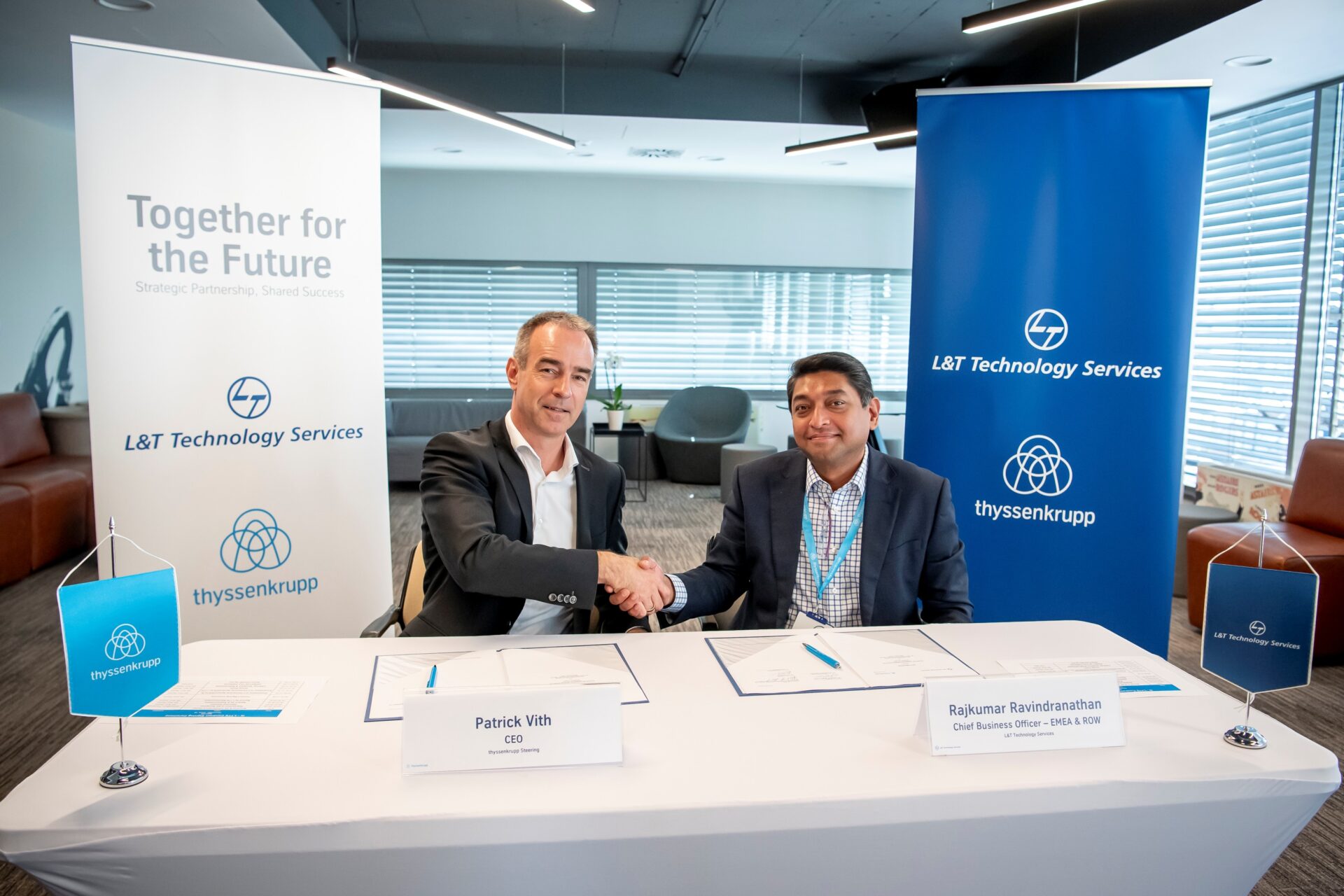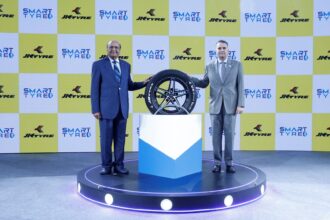Thyssenkrupp Steering, a globally recognized provider of steering systems, and L&T Technology Services (LTTS), a prominent engineering and tech services company, have announced a strategic partnership to establish a dedicated software development hub in Pune, India. Finalized on June 30, 2025, this move marks a notable milestone for both organizations as they step further into the future of automotive software innovation.
Key Takeaways:
- A strategic partnership has been formed between thyssenkrupp Steering and L&T Technology Services (LTTS).
- The collaboration involves setting up a new software development center in Pune, India.
- LTTS will take on the responsibility of establishing and managing the hub on behalf of thyssenkrupp Steering.
- The focus will be on safety-critical software tailored for advanced steering technologies.
- This initiative supports thyssenkrupp Steering’s global engineering expansion.
- Core specializations at the Pune center include embedded systems, functional safety, and cybersecurity for connected vehicles.
- The aim: scale, faster time-to-market, and cost-effective innovation.
This partnership underlines LTTS’s strength in the mobility space, particularly in delivering safety-critical software for next-gen steering tech. It’s also a tangible move in thyssenkrupp’s global engineering roadmap, reinforcing LTTS’s growing reputation in intelligent and sustainable mobility solutions. LTTS will manage both the setup and ongoing operations of the Pune hub.
L&T Technology Services is no stranger to pushing boundaries. Known for helping clients craft safer, smarter, and more intuitive mobility experiences, their scope stretches from vehicle engineering to advanced software innovation. Their stature was recently reaffirmed with a “Leader” title in the ACES Automotive Engineering Services PEAK Matrix Assessment (Electric) by Everest Group. Their portfolio spans over 250 programs, 350 patents, and 45 R&D labs—with deep roots in electrification, hybrid systems, and software-defined vehicle architectures.
thyssenkrupp Steering, on its end, brings a legacy of expertise in steering technology, enriched by knowledge in evolving electrical/electronic (E/E) architectures and software. Among its forward-focused developments is the Vehicle Motion Control system—an integrated approach that blends steering, braking, drivetrain, and dampers to elevate driving comfort, safety, and enable features for autonomous mobility.
Richard Hirschmann, Senior Vice President R&D at thyssenkrupp Steering, reflected on the collaboration: “We are pleased to partner with LTTS to expand our software capabilities in India. This center will play a central role in advancing development and delivering advanced steering solutions to our global customers.”
Adding to that, Patrick Vith, CEO of thyssenkrupp Steering, emphasized, “Our strategic goal is clear: to be the most reliable partner for steering solutions globally. We aim to influence the future of mobility through diligent efforts, operational rigor, and strong global partnerships.”
On LTTS’s side, Amit Chadha, CEO & Managing Director, stated, “This collaboration with thyssenkrupp Steering highlights LTTS’s standing in the mobility sector. Our proficiency in electrification, hybrid systems, and software-defined vehicle architectures contributes to intelligent, sustainable mobility. This partnership adds a key Tier-I partner to our portfolio and strengthens our positioning for future-ready mobility solutions.”
Rajkumar Ravindranathan, Chief Business Officer – EMEA & RoW at LTTS, added, “We’re excited to be part of thyssenkrupp’s ongoing evolution. With our background in safety-critical, software-driven product development, we will help accelerate development cycles, streamline execution, and bolster thyssenkrupp’s leadership in the space.”
The upcoming Pune center is more than just a software lab. It’s set to become a nucleus for innovation—delving into embedded systems, functional safety, and cybersecurity, which are fast becoming pillars of intelligent, connected vehicle ecosystems. The need for secure, high-performance automotive software is growing rapidly, and this hub aims to deliver on all fronts.
This partnership couldn’t come at a more relevant time. The automotive landscape is in flux—steered by electric vehicles, autonomous driving, and digital connectivity. Software, more than ever, is the real differentiator. The Pune hub, in this context, is not just a response to industry demand; it’s a proactive stride toward reshaping automotive intelligence. The joint strengths of thyssenkrupp’s domain expertise and LTTS’s engineering prowess are expected to spark real innovation in this evolving arena.
For thyssenkrupp Steering, this new base in Pune extends its R&D reach, opening access to India’s rich talent pool and enabling scaled innovation. Pune, known for its strong tech ecosystem, stands out as a strategic choice—blending engineering heritage with future-forward thinking. This aligns perfectly with thyssenkrupp’s goal to be a trusted global partner for cutting-edge steering systems.
As for LTTS, the partnership amplifies its role in the global automotive tech scene. Their deep experience in software-defined vehicle systems and stringent safety protocols resonates with the complex needs of today’s mobility challenges. With thyssenkrupp as a collaborator, LTTS is poised to enhance its engineering portfolio, foster talent growth, and further assert its leadership in high-impact automotive solutions.
Focusing on embedded systems, safety protocols, and cybersecurity is not just a technical choice; it’s a strategic one. These technologies form the bedrock of today’s vehicle intelligence. Embedded systems run everything from infotainment to power management. Functional safety, guided by standards like ISO 26262, ensures vehicle systems remain safe even when components fail. And in a world of connected vehicles, robust cybersecurity isn’t optional—it’s essential.
The mutual benefits are clear. For thyssenkrupp Steering, this means accelerated innovation, better access to software talent, and optimized costs—all vital to staying ahead in a fiercely competitive industry. For LTTS, it’s an opportunity to scale its automotive footprint, deepen its expertise, and showcase its ability to deliver complex solutions to top-tier clients. This partnership isn’t just about business—it’s about helping redefine how mobility is engineered.
More than just increasing capacity, this new hub aims to foster an innovation-driven environment. As cars become smarter and more autonomous, quick and efficient software development is becoming the true competitive edge. Together, LTTS and thyssenkrupp Steering are betting on that edge—positioning themselves as pioneers in the automotive software future.
The center’s work on Vehicle Motion Control—blending control over steering, brakes, powertrain, and suspension—is especially noteworthy. It represents a systems-level view of vehicle dynamics, crucial for high-comfort, high-safety, and autonomy-enabling technologies. What gets built here won’t just support current needs, but help set the direction for the vehicles of tomorrow.
In sum, the partnership between L&T Technology Services and thyssenkrupp Steering to build a cutting-edge development center in Pune is a meaningful move in the global automotive space. It reflects how critical software is becoming in vehicles and why strategic, collaborative investments in tech infrastructure are no longer optional—they’re imperative. Together, these two industry leaders are shaping the path ahead for smarter, safer, and more sustainable mobility.
FAQs about the L&T Technology Services and thyssenkrupp Steering Partnership:
Q1: What is the primary purpose of the partnership between L&T Technology Services (LTTS) and thyssenkrupp Steering?
A1: The primary purpose is to establish a state-of-the-art global software development center in Pune, India, focused on creating advanced automotive software solutions, particularly for steering systems.
Q2: Where is the new software development center located?
A2: The new software development center will be located in Pune, India.
Q3: What will be LTTS’s role in this partnership?
A3: LTTS will be responsible for establishing and managing the software hub in Pune on behalf of thyssenkrupp Steering. This includes developing safety-critical software for advanced steering technologies.
Q4: What specific areas of software development will the Pune center focus on?
A4: The Pune center will focus on cutting-edge software development areas including embedded systems, functional safety, and cybersecurity, all aligned with the growing demand for intelligent and connected vehicle technologies.
Q5: What kind of steering technologies does thyssenkrupp Steering specialize in?
A5: thyssenkrupp Steering specializes in developing steering systems and possesses deep knowledge of new electrical/electronic (E/E) architectures and software. Their work also includes forward-looking developments like the Vehicle Motion Control system, which integrates steering, brakes, drivetrain, and dampers for enhanced comfort, safety, and autonomous driving.
Q6: How will this partnership benefit thyssenkrupp Steering?
A6: The partnership will help thyssenkrupp Steering expand its software capabilities, drive innovation in next-generation steering solutions, gain access to a skilled talent pool in India, and accelerate time-to-market for its products.
Q7: How will this collaboration benefit L&T Technology Services?
A7: This collaboration will reinforce LTTS’s leadership in the mobility space, add a prominent Tier-I automotive partner to its portfolio, deepen its expertise in safety-critical software, and reaffirm its role as an innovation partner for future-ready mobility solutions.
Q8: What is the significance of focusing on “safety-critical software” in this partnership?
A8: Safety-critical software is crucial for automotive applications, especially in steering systems, as any malfunction could have serious consequences. The focus ensures that the developed software meets rigorous safety standards (like ISO 26262) required for reliable and secure vehicle operation.
Q9: What is the Vehicle Motion Control system mentioned in the context?
A9: The Vehicle Motion Control system is a forward-looking development by thyssenkrupp Steering. It integrates steering, brakes, drivetrain, and dampers at a high level to enable higher comfort, advanced safety features, and capabilities for highly autonomous driving.
Q10: Why is Pune, India, chosen as the location for this software hub?
A10: Pune has emerged as a significant hub for automotive engineering and software development in India, offering access to a skilled professional workforce and a supportive ecosystem for technological advancement.


















